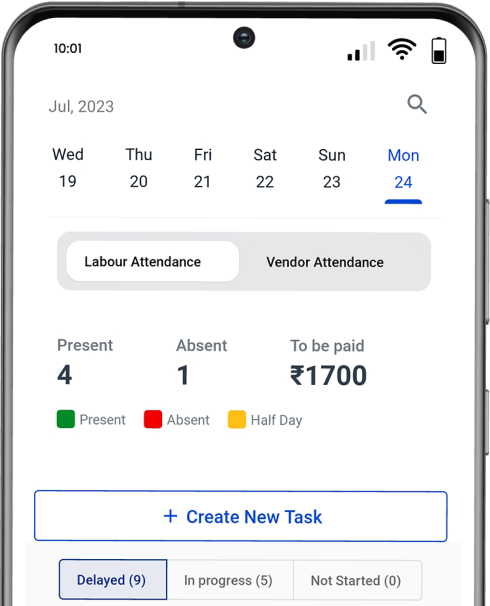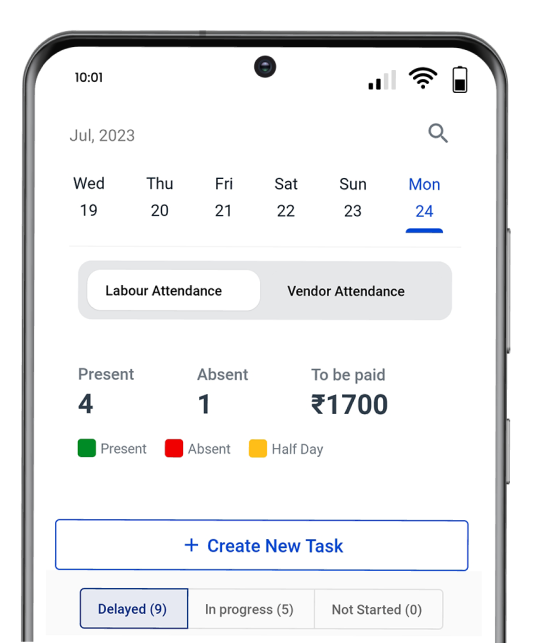Cement Price in Bangalore: Latest Cement Price List in June 2024
-
Sapna
- May 31, 2024

Staying updated with the latest best cement prices is crucial for budgeting and project planning. As of June 2024, the cement market in Bangalore shows a range of prices influenced by various economic factors. In this blog post, we provide a detailed information on cement price in Bangalore, helping you make informed decisions whether you’re handling a minor renovation or a major construction project. Discover the costs of popular cement brands like Ultratech, ACC, and Ambuja and how these figures fit into the larger landscape of Bangalore’s construction market.
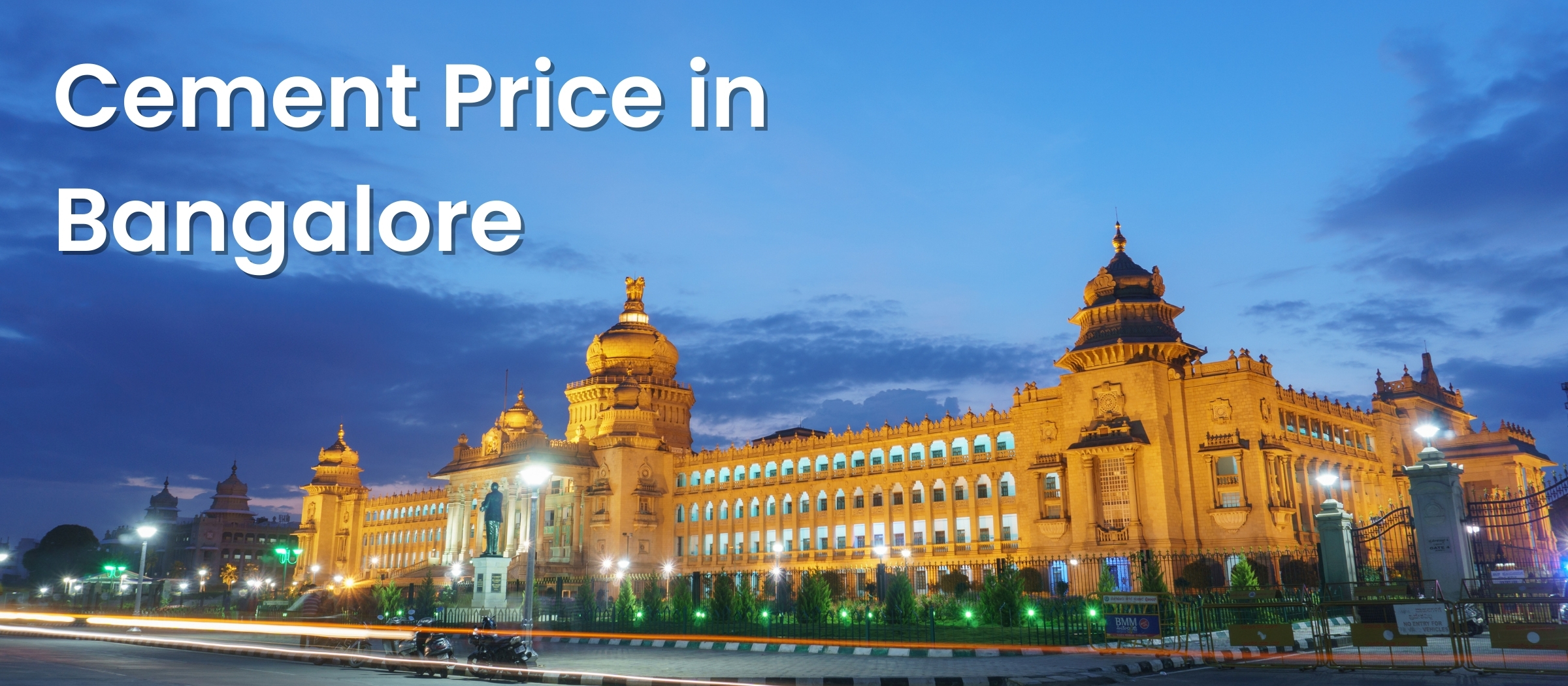
Table of Contents
Cement Price in Bangalore
In Bangalore, cement prices are influenced by several market dynamics, including fluctuating raw material costs, transportation expenses, and regional demand. The cement industry sees periodic price adjustments based on these economic factors, making it crucial for buyers to stay updated. As of late June 2024, there has been a range of price points depending on the brand and quality, reflecting the diverse options available to consumers.
Check out the detailed price table for various brands and grades of cement available in Bangalore
| Cement Brand | Grade | Price (50 bags) |
| Ultratech | PPC | Rs. 385 |
| Ultratech | Super | Rs. 410 |
| Ultratech | Birla Super OPC 53 | Rs. 420 |
| Ramco | PPC | Rs. 380 |
| Ramco | OPC 43 / 53 | Rs. 410 |
| Maha | PPC | Rs.335 |
| Maha | OPC 43 / 53 | Rs.360 |
| Maha | Gold | Rs.350 |
| Priya | PPC | Rs.324 |
| Priya | OPC 43 / 53 | Rs.352 |
| Chettinad | PPC | Rs.335 |
| Chettinad | OPC 43 / 53 | Rs.355 |
| ACC | Suraksha | Rs. 375 |
| ACC | Concrete Plus | Rs.390 |
| ACC | OPC 43 / 53 | Rs. 410 |
| Zuari | PPC | Rs. 365 |
| Zuari | OPC 43 / 53 | Rs. 390 |
| Dalmia | PPC | Rs. 350 |
| Dalmia | OPC 43 / 53 | Rs. 380 |
| Coromandel | PPC | Rs. 340 |
| Coromandel | OPC 43 / 53 | Rs. 375 |
Note: The above pricing list is as of June 25th, 2024 and includes GST. Please note that prices may vary based on the quantity of cement ordered and the exact location of the site.
GST on cement price in Bangalore
As of 2024, the GST rates for various types of best cement in Bangalore and throughout India remain uniform. Here’s an updated overview of the GST rates applicable to different types of cement:
| Construction material | Applicable GST |
| Slag Cement | 28 percent |
| Super Sulphate Cement | 28 percent |
| Portland Cement | 28 percent |
| Aluminous Cement | 28 percent |
| Mortars | 12 percent |
| Refractory Cement | 12 percent |
| Concrete | 12 percent |
- Slag Cement, Super Sulphate Cement, Portland Cement, and Aluminous Cement attract a 28% GST. This high rate applies uniformly across all states, including Karnataka, and does not vary based on whether the cement is coloured or clinked.
- Mortars, Refractory Cement, and Concrete: These construction materials are taxed at a lower rate of 12%. This is part of an effort to rationalise the tax structure and reduce costs for specific construction activities.
The standardisation of GST rates at 28% for most types of cement reflects the government’s approach to maintaining a consistent tax regime across different states and types of cement despite the rising costs in the cement industry due to increased logistics costs. This uniformity is aimed at simplifying the tax system and reducing administrative burdens on businesses.
Impact of cement price hike on Bangalore’s market
The recent hike in cement prices in Bangalore, with an average increase of Rs 15-20 per bag, has a noticeable impact on the local market, especially in the real estate sector. This price surge is attributed to various factors, including increased government spending on infrastructure, which paradoxically helps sustain the demand for cement despite the rising costs.
This increase in cement costs is expected to drive up the prices of new properties in Bangalore’s real estate market. The city’s real estate sector is projected to grow by 5% annually, suggesting a resilient demand that might offset the impact of higher construction costs. However, the higher material costs may slow down the pace of new construction slightly as developers adjust to these increased expenses.
Additionally, investment opportunities in emerging areas like Binnypet, Devanahalli, and Doddaballapura could see higher property valuations due to their strategic locations and the anticipated growth in demand.
What did the Government do to bring down the cement prices?
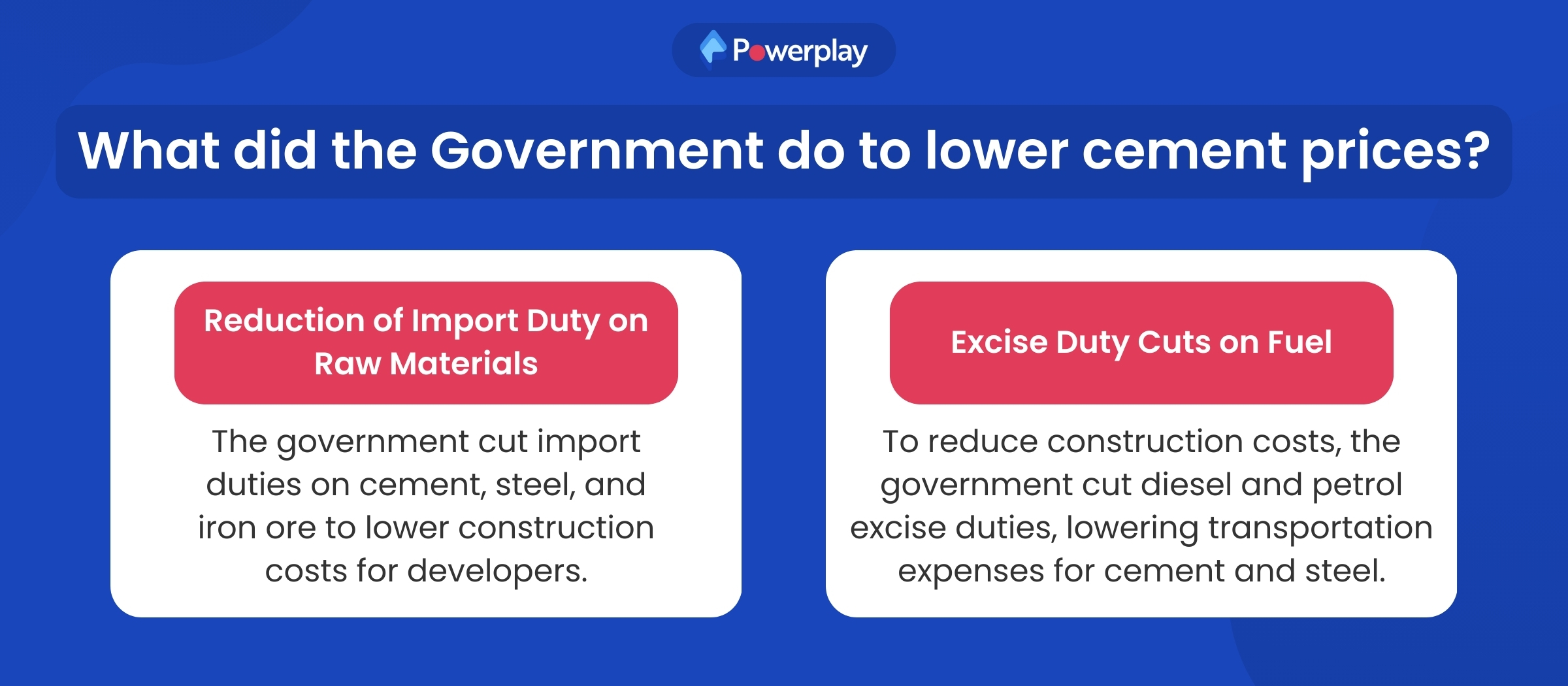
In response to the escalating housing prices, the Indian government has implemented fiscal measures aimed at reducing the cost pressures faced by developers and encouraging activity within the real estate sector. These measures include:
Reduction of Import Duty on Raw Materials:
The government reduced the import duties on essential raw materials like cement, steel and iron ore. This strategic cut is intended to lower developers’ manufacturing and procurement costs, making construction projects more financially feasible.
Excise Duty Cuts on Fuel:
Recognising the significant impact of transportation costs on overall construction expenses, the government announced substantial cuts in excise duties on diesel and petrol, Rs 6 per litre and Rs 8 per litre, respectively. These reductions are expected to decrease the operating costs of transportation of construction materials such as cement and steel, further easing the financial burden on developers.
How do cement prices impact the input cost of construction?
The surge in cement prices, currently hovering between Rs 360-400 per 50 kg bag, marks a notable increase of over 10% annually. This price hike is largely driven by escalating costs of key inputs like coal and crude oil, essential for cement production. The rising input costs, coupled with an increased demand for cement, exert substantial upward pressure on overall construction expenses.
Builders, grappling with simultaneous hikes in other raw materials and increased lending rates, are often forced to pass these elevated costs onto consumers. While developers with robust cash flows may delay price adjustments, many are withdrawing offers and discounts previously available to buyers, balancing their financial strategies against market dynamics. This scenario underscores the delicate balance developers must maintain between managing costs and sustaining buyer interest in a volatile economic environment.
Associated input cost of constructing a house in Bangalore
In Bangalore and other parts of Karnataka, the surge in the prices of key construction materials such as cement, steel, iron, pipes, and fuel has led to a notable increase in housing costs. According to the Confederation of Real Estate Developers Association (CREDAI), the cost of construction has risen by about 30%, pushing the selling prices of new properties up by 5-10%. This escalation in input costs not only impacts the final pricing but also restricts developers from offering discounts or flexible payment options to potential buyers, as their capacity to absorb these costs is limited.
How will the increase in cement prices affect housing projects?
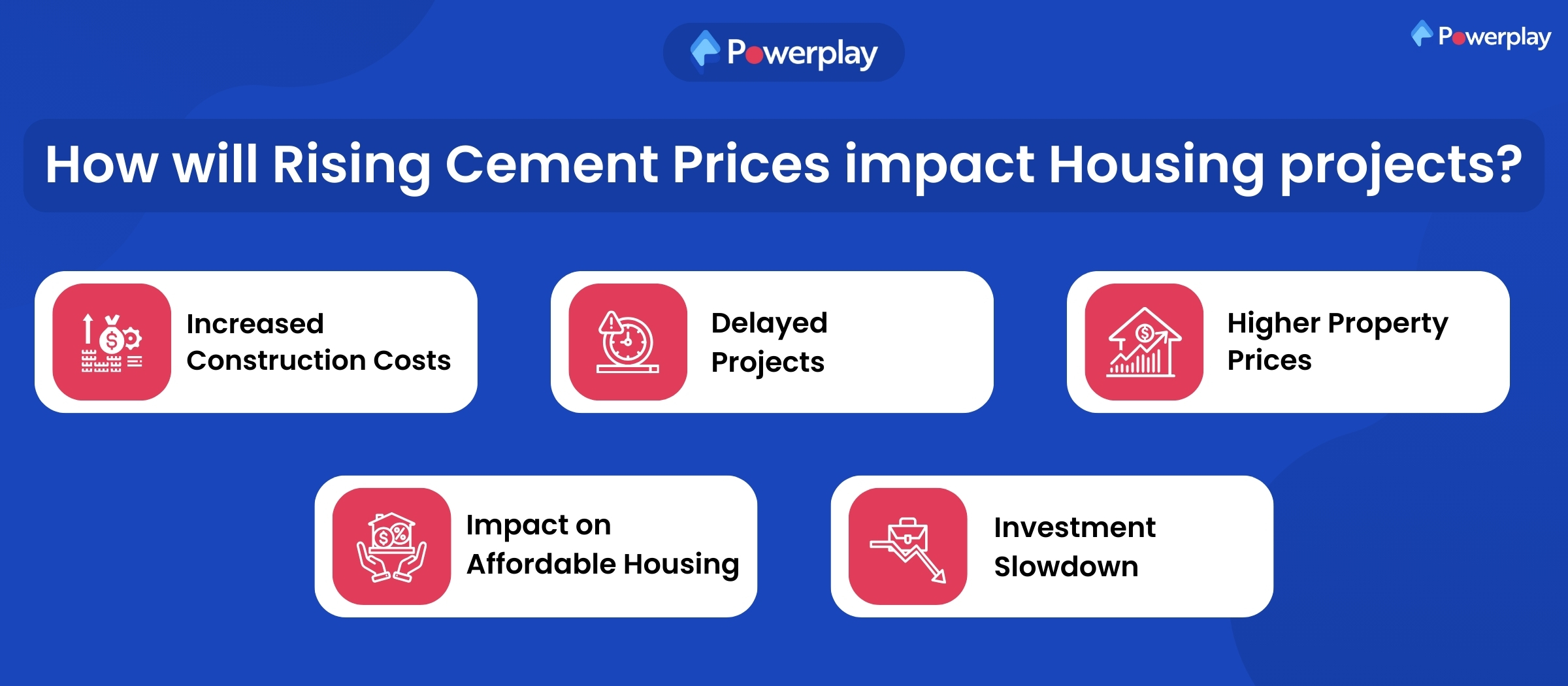
The increase in cement prices can affect housing projects in several ways:
Increased Construction Costs:
Higher cement prices directly increase the cost of construction materials, leading to an overall rise in the cost of building homes.
Delayed Projects:
Developers might delay the launch or progress of new housing projects as they reassess budget allocations and funding in light of increased material costs.
Higher Property Prices:
The increased cost of construction is often passed on to buyers, resulting in higher prices for new homes.
Impact on Affordable Housing:
Projects aimed at the affordable housing segment could be particularly affected as margins are tighter and the ability to pass on costs to buyers is limited.
Investment Slowdown:
Potential investors might be cautious, leading to a slowdown in investment in the housing sector until price stability returns.
Cement price in Bangalore: Recent developments
Recent developments in Bangalore’s cement market have primarily revolved around fluctuating prices due to various economic factors. As of June 2024, the prices of different cement brands in Bangalore vary slightly but have generally seen an increase compared to previous months. Brands like Ultratech and ACC are priced around Rs. 375 and Rs. 390, respectively, for a 50kg bag. Other brands, such as Ambuja, Dalmia, and JK Cement, also show similar trends, with prices hovering between Rs. 340 and Rs. 410.
This price variation is attributed to factors such as the cost of raw materials and transportation, economic policies, and market demand. Suppliers in Bangalore maintain a diverse portfolio of cement grades to cater to different construction needs, ensuring that despite the fluctuations, construction projects can proceed without significant delays.







